Even if you carefully guard your security when using dating apps—whether by using a fake name or downloading a VPN—people who use dating apps still face a growing risk: the romance scammer.
It’s almost been a year since the Netflix documentary The Tinder Swindler became a streaming sensation. The film tells the story of Israeli conman Simon Leviev (real name Shimon Hayut), who scammed more than 10 million USD from a handful of women. Simon posed as a wealthy, jet-setting diamond mogul and met his victims on Tinder.
The tale of Simon and three of his victims were so shocking and titillating that the show became the only Netflix original documentary to make the top 10 charts in 92 countries in 2022.
And, while The Tinder Swindler’s storyline mainly focuses on Simon’s deceitful behavior and scam tactics, it also thrusts two other issues into the spotlight:
- How difficult it is to spot a dating scammer (all of Simon’s victims said they didn’t see the signs until they’d already lost a lot of money).
- The harrowing, often fruitless plight that victims have to go through to try to get their swindled money back.
As we get closer to Valentine’s Day, these are the love scams to be aware of, ways you can spot a dating scammer, and what you can do if you’re a victim.
What are online dating scams?
How to avoid online dating scams: Watch out for the signs
Online dating scam examples
Online love scams are on the rise
4 misconceptions about online love scams
What to do if you’ve been scammed
What are online dating scams?
Online dating scams generally involve a criminal adopting a fake identity on a dating platform and feigning interest in their victims to con them (a phenomenon also known as “catfishing”). After earning their victim’s trust—often through declarations of love—the scammer either asks for financial help or requests intimate photos of the victim that can later be used to blackmail them.
How to avoid online dating scams: Watch out for the signs
Scammers are innovative and convincing with their tactics, so it can be difficult to know whether the person you’re speaking to on a dating app/site is looking for love or is just out to scam you. Here are a few signs a dating profile is fake, meaning the user has an ulterior motive.
1. They’ve only got one photo
And not much else. The lack of detail on their profile, like a description about themselves or their interests, might indicate they’re a scammer—or too lazy, which might not make them a great dating prospect either.
2. All they ever seem to talk about is crypto or finance
Are they always steering the conversation toward investments, cryptocurrencies, and other finance-related topics? These are common topics for bots and scammers.
3. They send you a link immediately after matching
A link might be part of a phishing attempt. A phishing link could ask for your personal info or could install malware onto your device. It’s not worth clicking on it.
4. They need help
They’re likely a scammer if they’ve asked to borrow money or require assistance in other ways.
5. They immediately try to take the conversation off the app
A scammer will try to get personal information like your phone number or email address as quickly as possible. Stick to chatting on the app until you’re comfortable giving your details.
6. Things are going way too fast
Excessive displays of affection, also known as “love bombing,” is a common method employed by scammers to reel in their victims.
7. Their conversations sound generic
Look out for language that seems too generic and lacks personality. Generic sentences suggest that the person you’re speaking to is actually a bot.
8. They try to make things sexual
A scammer might try to collect explicit images, videos, or texts from you to use them for blackmail.
9. They look too good to be true
If their profile is filled with professional shots and pics of them in expensive cars or private planes, consider their credibility lowered. Scammers often use stock photos of fancy lifestyles.
10. They never meet up in person
One of the biggest red flags. If you’ve been chatting for weeks (or longer) and want to go out but they keep putting you off with excuses, they’re probably not who they say they are.
Online dating scam examples
Romance scammers primarily take advantage of people looking for romantic partners and long-term relationships. With fraudsters on the rise, these are some of the most common love scams to be aware of:
Catfishing
Catfishing refers to the act of creating a fake online persona to deceive people. The catfisher often uses someone else’s photos and invents a false identity to establish relationships or manipulate others for personal gain. While a catfishing scheme could be to cheat the victim out of money, it could also be just for the amusement of the perpetrator.
Crypto scam
An online-dating crypto scam typically involves a person pretending to be interested in a romantic relationship while secretly aiming to defraud their target of their cryptocurrency or to persuade them to invest in a fraudulent crypto operation. It uses the popularity of cryptocurrency and people’s greed get them to send money.
Intimate activity and photo scams
Here, a scammer will build trust and rapport with their victim, convincing them to send intimate photos or messages. The con artist may also record intimate video calls with their victims. This is done with the intent to blackmail their victim for money, threatening to leak the sensitive material unless they’re paid.
Asking-for-help scam
In this scenario, a scammer pretends to be a legitimate person looking for love. Once they’ve gained the trust of their target, they’ll feign an emergency, a medical procedure, or travel expenses. The Tinder Swindler is a prime example of this kind of scam.
The military romance scam
The scammer poses as military personnel deployed overseas. Once they’ve become closer, they’ll convince them to transfer money for travel expenses, food, or housing. In 2017, Olayinka Illumsa Sunmola was given a 27-year sentence for creating fake dating profiles that primarily targeted widows, divorced women, and those over 50. In his scheme, he used the name and image of a U.S. Army colonel stationed overseas on dating profiles.
Malware scams
This scam sees fraudsters send a seemingly non-threatening link to their victim or include a link in their dating bio that seems harmless. After clicking the link, the victim’s device will automatically download malicious software that could lead to their data getting stolen.
Fake dating sites scams
Some scammers create an entirely fake dating site or app that imitates a genuine platform. This is done to trick their victims into entering personal or financial information.
Sales scam
In this type of scenario, someone on a dating site tries to get their targets to buy goods or services through them. The user starts off seeming to be interested in dating when actually they are just acting as a salesperson, perhaps earning commissions for each sale.
Professional dating scam
Professional daters are people who try to find people to go out with on dating apps, in order to score a free meal and enjoy other free (possibly luxurious) activities, assuming the person they’re going out with is footing the bill. Pro daters have no intention of starting up a relationship, unless they realize they could exploit the target further.
Online love scams are on the rise
Online dating has become increasingly popular thanks to the emergence of dating apps like Tinder, Bumble, and Hinge, and the trend is expected to continue.
According to Statista, close to 51 million Americans are registered on online dating services, which is expected to increase to 53.3 million by 2025. Global statistics estimate that over 300 million people use dating apps worldwide in 2021.
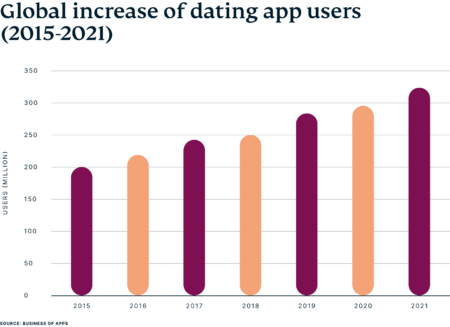
When it comes to the popularity of apps people use to find romance, Business of Apps has found Tinder reigns supreme in the U.S., followed by Bumble, Plenty of Fish, and Hinge.
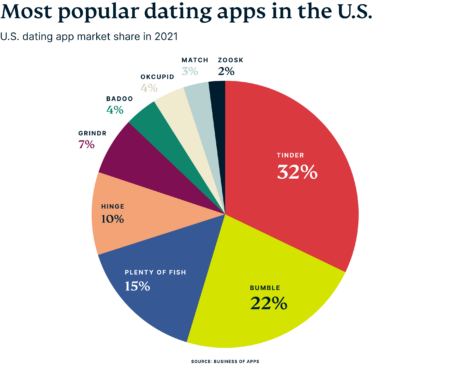
Worldwide, Tinder also holds the crown as the most popular dating app, followed by UK-headquartered app Badoo. Bumble, which originally marketed itself as a female-friendly app, and China-based Tantan come next.
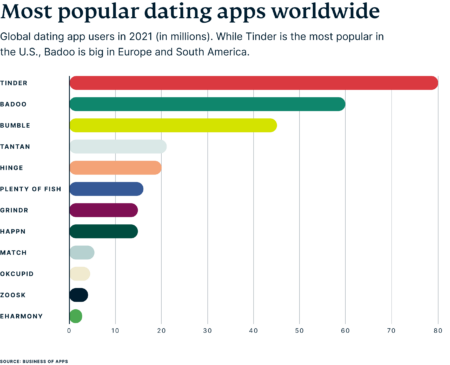
Not surprisingly, Valentine’s Day generates a slight uptick in dating app demand, according to a recent study by Apptopia. Meanwhile, in a survey conducted by cybersecurity company ESET, 52% of respondents said Valentine’s Day loneliness makes them vulnerable to catfishers. As more people flock to register on dating sites to find romance, so do more scammers.
In fact, according to a report released by the U.S. Federal Trade Commission (FTC) on romance scams, an estimated 547 million USD was lost to dating fraudsters in 2021 alone—an 80% increase compared with the previous year and a number that’s only expected to keep going up as more users sign up to online dating sites.
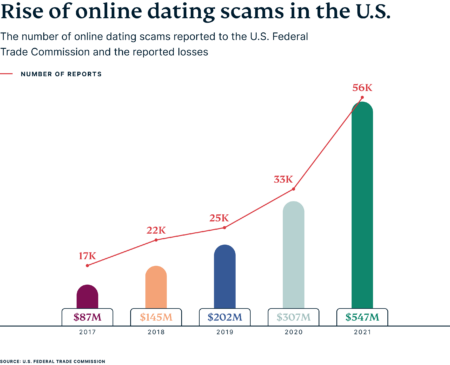
4 misconceptions about online love scams
Think you’re savvy enough to avoid a dating app scam? Here are a few misconceptions about scams to be aware of.
Misconception #1: Dating apps are scams
No, popular dating apps themselves are not scams, although there are users who are scammers. Online dating scammers use the apps to find and communicate with their victims. Scammers might also create fake copycat dating sites that mimic genuine dating sites. In 2021, cybersecurity company Trend Micro detected over 15 million fake dating sites.
Always download apps directly from the App or Google Play Store to ensure their legitimacy.
Misconception #2: Women are more likely to fall for scams
While most dating scam victims featured in the media, like The Tinder Swindler, are women, research has found that men are twice as likely to fall for romance scams than women. In a recent Tessian Cloud Email Security study, 11% of men reported falling for romance scams compared with 5% of women.
Misconception #3: You’ll get your money back
After falling victim to the “Tinder Swindler”, three of Simon’s victims, Cecilie, Pernilla, and Ayleen, set up a GoFundMe page to try to recoup the money they lost to the conman. The women raised 217,000 USD. Unfortunately, not all victims have any funds returned.
While romance fraud is considered a severe crime in the U.S.—with wire fraud or any type of online romance scam potentially leading to 20 to 30 years imprisonment—the FTC has said that it’s nearly impossible to identify and track down a scammer if money was wired to them through companies like Western Union and MoneyGram.
Additionally, scammers often use fake names and locations, making it even harder to track them down. In many cases, victims are also hesitant to report the scam for fear of embarrassment or shame, which can further complicate the process of recovering their losses.
Depending on the type of scam, its duration, and its complexity (as seen in the case of The Tinder Swindler), it might also be difficult to take legal action against a romance scammer.
Even though Simon was sentenced to 15 months in jail, he was released after five months. Simon continues to walk free as his crimes are too vast and too complicated to legally pin down for prosecution, according to The Making of a Swindler podcast.
Misconception #4: Scammers work alone
While some scammers might work alone, reports have found that romance scammers often work in groups as part of professional crime syndicates. In a recent exposé, Channel News Asia investigated how romance crime syndicates in Asia have expanded their scope to target victims in the U.S. and Europe.
The feature revealed how scammers are trained to build relationships with their victims and use subtle tactics to persuade them to deposit money in investment instruments.
What to do if you’ve been scammed
If you suspect that you may be a victim of a romance scam, follow these steps:
- Take screenshots of conversations where the scammer has specifically asked for money. When making reports, you might need to provide evidence that you’ve transferred money or have discussed making monetary transactions.
- Report and block the scammer.
- Contact your bank immediately to request a transaction reversal if you’ve paid the scammer through a credit, debit, wire, or cryptocurrency transfer.
- Report the scam to the police and the FTC (if you’re in the U.S.).
Due to the emotional nature of the crime, many victims of love scams often suffer from psychological trauma and post-traumatic stress disorder. If you live in the U.S. and are a victim of a love scam, don’t hesitate to reach out to the Society of Citizens Against Relationship Scams (SCARS) for support.
And if you’re going through a rough breakup, whether you’ve been scammed or not, there are apps designed to help you through the process.
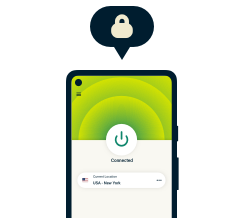
Privacy should be a choice. Choose ExpressVPN.
30-day money-back guarantee



























Comments
I’ve been chatting with a new contact in Face Book. The first five days of chatting with him was so nice but suddenly, he started saying he had fallen in love with me. Wanted a future. A family. Was a widower with an 11 year old son. Wanted to meet for a lovely romantic Xmas dinner with me professing love and also religious content. He then told me he was having WiFi problems at his work. Told me that the employers had forbidden them to download FaceBook but he did and found me. Said that I was his one and only contact. That he had fallen in love with me and wanted to continue chatting and didn’t want to lose me but there was this wifi issue at his work and would I rush out to a grocery store or wherever they sold gift cards that I could send to him by raking a photo of it and send to him. He sent me a photo of what he wanted which was 1000 euros. I converted that to $1640.00 Canadian!!! Holeeee. Just asking asking for me to spend money on ANYTHING for him so soon triggered my suspicions. Rang some alarms. I refused. He kept on and then started almost begging. I’ve refused all but before this started I gave him my WhatsApp phone number so we could chat that way as he wanted to video chat. Had wanted google chat but my being unfamiliar with it and always used WhatsApp with my family and friends I’ve denied goggle chat and insisted on WA. He at first refused that but now he wants to. On the fifth day he started being very pushy. So that’s what’s happened so far . I want to continue for a while in WA as he insists he is legitimate and not trying to scam me. I just don’t know what to do now. For years I’ve closed myself off to romance and only wanted online friendship. So please. If this is happening to you be very careful. Keep refusing requests even if it is just for gift cards as if he is a scammer, he doesn’t care about your feelings. He’ll come across like a child who wants his lollipop. Well. His lollipop is more than likely what you can do for him financially or your bank account.
Now I’m done with this and I wish all a happy holiday season.
Rochelle
much info was not given in the article